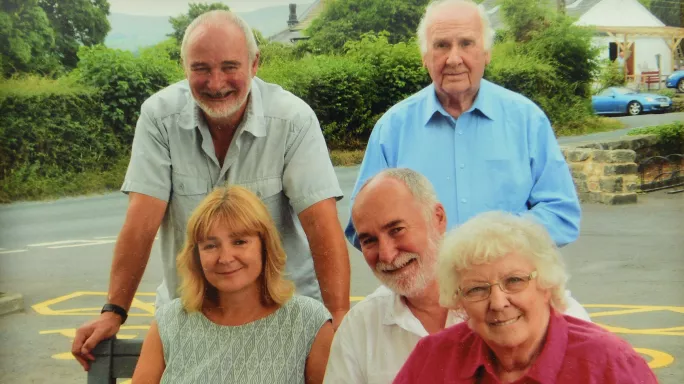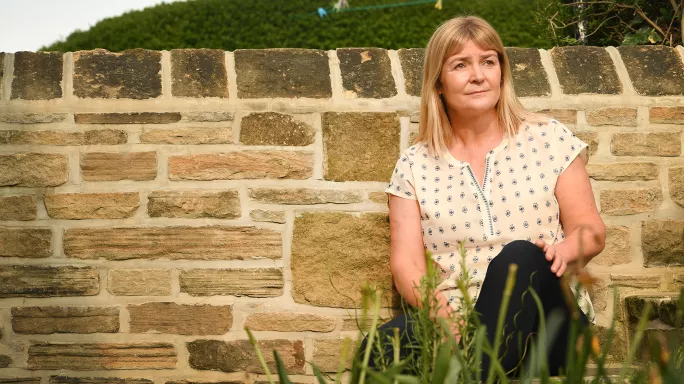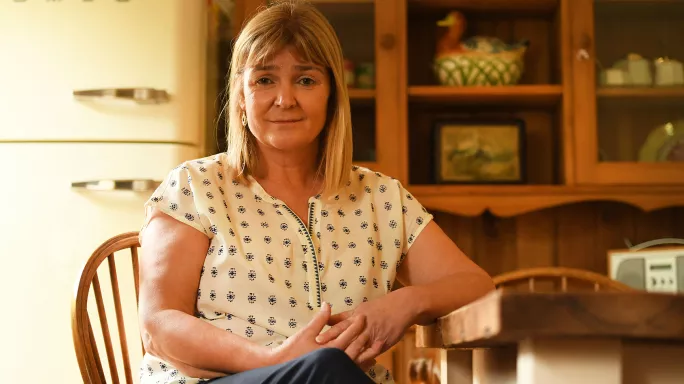- Home
- ‘Our schools are at breaking point - but we must stay positive’
‘Our schools are at breaking point - but we must stay positive’

When she was growing up, Judy Shaw recalls that there were two things which mattered most to her father: education and trade unionism.
“My dad believed that education was the route out of poverty, ignorance and oppression of any kind.
“That is why I went into teaching - because my family valued education above everything else.”
Quick read: Ministers urged to tackle poverty
SEND: Teacher speaks out on autism waiting lists
Background: Leading head tells of heartbreak at cuts
Shaw was one of three siblings from her family (pictured below) in Bury who joined the profession.

“My mum and dad were very proud that all three of their children went into teaching. I have two much older brothers who both became teachers. They both married teachers. I have always thought that I would want to be a teacher.”
She has now been working in schools for more than 30 years and for the past 14 as the head of an infants’ school in a mill town in Calderdale, West Yorskhire.
But this weekend she is preparing to swap her small school for the national stage as she becomes president of the NAHT headteachers’ union.
The importance of trade unionism is another thing that has been handed down to her.
Her father, John Shaw, who died in autumn last year, was a proud member of USDAW (the Union of Shop, Distributive and Allied Workers).
“My father believed every worker should have a voice. He was an active member of USDAW through his working life, into his retirement, until the day he died. His union card was on his bedside table and I’ve got it. That is why I am here. I want to do his memory justice.”

Shaw was a member of a trade union as a teacher and, after taking up headship and joining the NAHT, a role on the union’s national executive followed.
She is now set to become the union’s first president from the early years sector for more than a decade.
In the build-up to her term as presidency, she has started to adjust to life outside the day-to-day routines of running a school.
She tells Tes she is determined to use her platform to represent the needs of the profession and to give a voice to what she describes as “ordinary schools”.
Shaw wants to be positive about the teaching profession, which she describes as a wonderful thing.
But she also wants policymakers to know that “schools are at breaking point.”
Heads speaking out on school funding
“What are the biggest concerns of heads? Well in big fluorescent Tracey Emin letters, it has to be funding,” she says.
“There are heads now all over the country who are speaking out. It is very difficult to stand on your school steps and say to your community, to your parents, to those who you are accountable to that you haven’t got everything you need, that you can’t meet the needs of pupils, that the roof is leaking
“Its really difficult because people start to think negative things about your school and because heads are typically very positive, hugely optimistic.”
She says that funding pressures are being felt particularly keenly in small schools.

“Mine is a small school and we feel a threat. It is more and more difficult to prove that it is sustainable - our school is sustainable but you feel the threat.
“For those who say small schools are not viable, I would say they are vital. They are often the last centre left that people can go to in a community and the first place where people can find support.”
Shaw has been head at Tuel Lane Infant School, in Sowerby Bridge, a small town near Halifax, since 2005. It serves just over 100 pupils largely drawn from a community of terraced housing around the school.
When she arrived at the school at the turn of the millennium as a teacher, it was rated “inadequate”. But Shaw has been part of a turnaround which has seen Tuel Lane maintain a “good” rating since 2002.
“I didn’t intend to stay that long,” she says. “I was up-and-coming and had been happy moving around but something caught me about the school. I like the community and there hasn’t been a dull day.”
Shaw speaks with great affection about the community that the school serves but also with some sadness. An increasing part of her day-to-day life has been coming to terms with and supporting pupils living in poverty.
“As I look at the terraced streets around my school, more and more have been bought up by private landlords - now, there is nothing wrong with that - but pupil mobility is greater and with some of the properties you can tell that they have not been maintained, and I think that is the same across the nation,” she says.
“There are families living in cramped conditions, children sharing beds. They are tired out and the worst thing is the children can see for themselves that things are not quite right with their lives and in their homes.”
Shaw says that increasingly schools have been left to buy in or provide support for their pupils that was once provided by local authorities.
“Most of our families are hard-working and getting by but in the past four to five years we have seen poverty that I think would surprise some people.
“It is not everyone in our community - it is important to say that - but you have got children arriving in school hungry. They are inadequately dressed. Just turning up to school, they haven’t got enough clothes on. We have got holes in shoes. We’ve got children who are tired, children with a pallor showing that they are not getting the diet or the exercise that they need.”
Child poverty needs urgent attention
When she takes to the NAHT stage for the union’s annual conference in Telford this weekend, Shaw will have a stark message for the government.
“I am going to call on them to look up from their Brexit dossiers and have a good look around them and see what is happening to the children. We need recognition, we need understanding, we need compassion and we need immediate support.”
The NAHT has been vocal on a number of fronts in recent years. Funding remains front and centre but the union is also campaigning on the importance of recruitment and retention and on the concerns it has about the current accountability system of league tables and Ofsted.
As Shaw discusses Ofsted, she touches on many of the messages that the union has been sending out - that the current system does more harm than good, that the new Ofsted framework could leave schools open to subjective judgements from inspectors.
‘I felt almost terror before Ofsted visit’
But it is when she reflects on her own personal experience of school inspection that she speaks most powerfully.
“Over my years, as that year approaches when we know we are going to be inspected I am fairly ashamed to say, but I am not too ashamed to stand up and say it, I have felt almost terror sometimes. And I know that I have put undue pressure on my staff in school.

“And sometimes I think I veered off course. I have veered off the chosen course we have set with the context of our school. I have introduced ineffective, burdensome marking schemes. I have questioned practice in my Reception class. I have doubted my own ability to lead and I have spoken to lots of other heads about this, and I don’t think it’s uncommon.”
After graduating from Lancaster University, Shaw trained to be a teacher at St Martin’s College in the same Lancashire city in the late 80s.
She still keeps in touch with friends from those days. She recalls how on a reunion with a friend who is also the head of a successful school, they came to discuss how Ofsted was expected soon in their respective schools.
Shaw says: “Now we have both been in the profession for 30 years. Nobody had ever criticised our teaching. They have praised it. Nobody has ever criticised our leadership so we are two successful professionals and my friend said to me, ‘Maybe this is the year Ofsted find me out.’
“‘What would you do if this happens?’ We talked about being in our 50s. We could try supply teaching. But you’ve to stop and shake yourself and ask why are two successful professionals who have never had criticism levelled at us throughout our career, why are we sitting there with this fear. That is an accountability system that is too punitive.”
Shaw says that she has promised to herself that she will be stronger next time but the admission of the impact that inspection has had on her will surely chime with school leaders across the country.
Sat at her kitchen table at her home in West Yorkshire, Shaw speaks passionately about a range of issues, support for special needs pupils, school funding, the importance of early years.
But despite these countless concerns, you get the sense that the thing she wants to do more than anything else with her role as NAHT president is to positively champion the job of teaching.
Shaw began teaching in 1988 at a primary at RAF Finningley, Doncaster.
She then moved to what was Broad Square Infant School in Liverpool. She describes this job as the making of her.
“I found it to be absolutely joyous. We had an inspirational teacher and a young staff and what we lacked in experience we made up for in enthusiasm.
‘Teaching is an incredible thing’
“We talked about teaching all the time. I think teaching is an incredible thing,” she says.
“One of the joys of being a headteacher is that you get to watch so much teaching and learning.
“When you see that moment, the right moment where you have the words, the explanation and the demonstration.
“And then the child speaks, reads, writes, calculates, jumps, sings and paints with more confidence - a life has been changed forever. It always moves me and inspires me.”
As she becomes president of the NAHT, this is what she wants to champion and what she knows she will miss seeing at Tuel Lane.
“One of the things I want to say is that we are a trade union so tell us your issues and we will tackle them, but I want to be positive because all we talk about sometimes are the issues, the challenges. But teaching is fantastic.
“It is a wonderful job and we mustn’t lose our positivity about it. And it’s the little day-to-day bits, you walk around your school and you see positive things every day. It’s watching a child climb up the wall bar and everyone is cheering because he has gone higher than before.
“And they might only be three foot off the floor but you know next week they will go a bit higher - that is what I am going to miss.”
CV: Judy Shaw
- PGCE at St Martin’s College, Lancaster
- Teacher at Hayfield Lane Primary, Doncaster
- Teacher at Broad Square Infants, Liverpool
- Teacher at Royds Infants, Heckmondwike
- Teacher at Leeside Primary, Heckmondwike
- Teacher and headteacher at Tuel Lane Infant School, Sowerby Bridge
- NAHT president
Keep reading for just £1 per month
You've reached your limit of free articles this month. Subscribe for £1 per month for three months and get:
- Unlimited access to all Tes magazine content
- Exclusive subscriber-only stories
- Award-winning email newsletters



